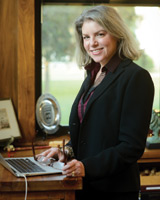“The shift from writing as a student … to writing as a writer … is one that we want each of our students to make.”
 Last May, I began a practice known as “morning pages” as described by Julia Cameron in her well-known book The Artist’s Way. Morning pages are three pages of hand-written free writing ideally accomplished right away after waking up. I committed to do this every morning and tried to adhere to her core piece of advice: “There is no wrong way to do morning pages.”
Last May, I began a practice known as “morning pages” as described by Julia Cameron in her well-known book The Artist’s Way. Morning pages are three pages of hand-written free writing ideally accomplished right away after waking up. I committed to do this every morning and tried to adhere to her core piece of advice: “There is no wrong way to do morning pages.”
Some days, my writing reflected on issues or problems that were on my mind. Other days, I would find myself writing about the things that were most meaningful or precious to me. Some days, I would realize that I was daydreaming instead of writing—and then I would write about that. Morning pages aren’t as formal as a journal, and they aren’t meant to be read. Cameron’s claim is that regular engagement with this practice will make one a better and more prolific writer—not just of the morning pages but of “real” writing.
I wasn’t at all sure that this morning practice could have such an effect. But because there were several things I wanted and needed to write over the summer, and because summer is a time when I have some open space in which to try new things, I got myself a spiral notebook and a good pen and began writing three pages by hand as soon as I got up (well, right after I made a cup of tea).
To my surprise, my writing transformed almost immediately. The practice of informal, morning writing seemed to limber up my ability to get into a flow. It gave me confidence that I could set word count limits for myself and meet them without distraction. And, it provided a place where I could experiment with voice and style without worrying about a reader. Because of this, when I sit down to create a more polished piece of writing, I am more agile and focused.
The work I have been doing to develop as a writer made me particularly excited about our celebration of ’Roos Who Write during Homecoming this fall. Inspired and directed by Dr. Carol Daeley, this program brought accomplished alumni writers of all types back to campus to share their wisdom. Playing to packed rooms, our authors described their work and its astonishing variety—novels, poetry, cookbooks, graphic novels, songs, script writing, and more. It was extremely inspiring to hear that Austin College had given these authors not only the tools to write well but also the kind of education that results in having something of meaning and depth to say.
The shift from writing as a student—where writing feels like a labored test to fulfill an assignment and earn a grade—to writing as a writer—where writing is an expression of truth, passion, and ideas—is one that we want each of our students to make. Strong writing is what we call a transferable skill, i.e., one that serves every profession and every form of leadership.
Moreover, writing is now only one of many such communication techniques. Ideas continue to be spread through the written word but they are also increasingly spread through visual images, multi-media presentations, and strong design. We want our Austin College graduates to be comfortable creating and interpreting messages in all of these modes. And we are investing in this wider understanding of literacy.
In support of the objectives of our strategic plan, our faculty members are working to enhance our writing curriculum, making sure that every student has the opportunity to grow as a writer over four years. Faculty members also are transforming their classes to make better use of new technologies so that students can match the medium to their message and goals by creating podcasts, digital archives, blogs, and videos. Our students are digital natives, but their facility with accessing new technologies doesn’t by itself mean that they know how to make effective use of them as part of a communications strategy—any more than knowing how to form or type letters makes one an excellent writer.
Read our strategic plan. I would love to hear from you about the ways that Austin College helped you add value to the world and about the transferable skills that have proven most important in your career and your life’s work.
Warmly,
Marjorie Hass
President
